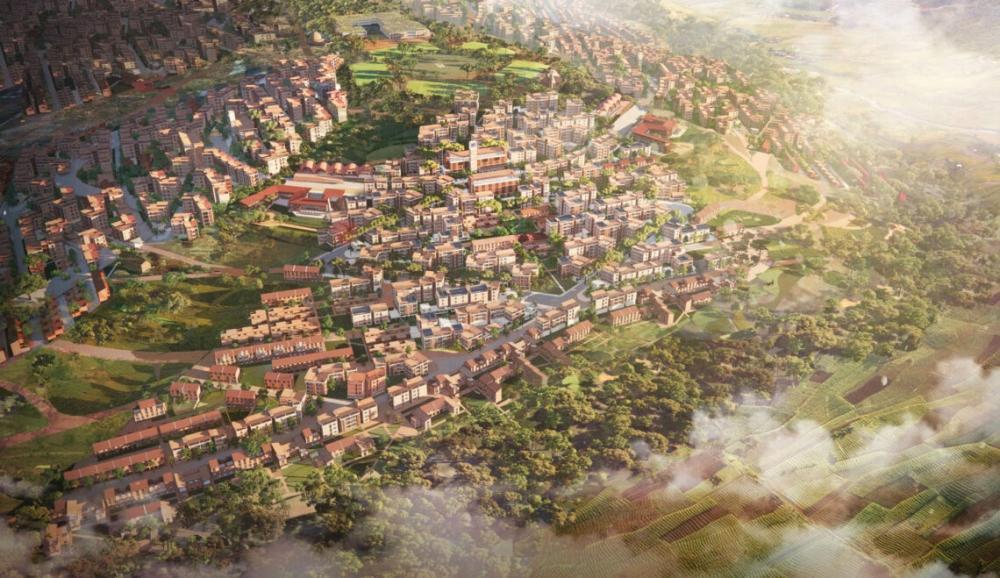Africa-Press – Rwanda. Ngaruyinka Village, located in Kinyinya Hill, Gasabo District, is set to undergo a sustainable transformation valued at $35.1 million (approximately Rwf50 billion), according to the Rwanda Green Fund, the country’s climate and environment investment facility.
The planned redevelopment forms part of the initial phase of the broader Green City Kigali (GCK) project, a pioneering urban development initiative envisioned to create sustainable, inclusive, and climate-resilient communities.
Under a project titled “Green City Kigali: A New Model for Urban Development in Rwanda,” the government has allocated Rwf3.8 billion in the 2025/26 national budget. These funds will support detailed design work, environmental and social safeguards (ESS), and the establishment of a dedicated project management unit, according to the Rwanda Green Fund.
A feasibility study places the current population of Ngaruyinka at 1,634 residents across 321 households. However, the upgrade is expected to directly benefit over 30,000 people by the time it is completed in 2029.
The Ngaruyinka project has been selected to provide a model for climate responsive upgrading of informal settlement, it pointed out, stating that the objective is to create a model approach which can be upscaled and applied to multiple situations across Rwanda to maximise positive climate impacts in line with the Green City Kigali (GCK) approach.
The Green City Kigali: a new model for urban development in Rwanda, pilots sustainable upgrades in informal settlements, promoting climate resilience, future replication, technical support, and greenfield housing development, Rwanda Green Fund indicated.
Some of the specific interventions under the project include a focus on sustainable upgrading of informal settlements through a climate-resilient, multi-sectoral pilot project in Ngaruyinka Village, Kinyinya Hill, Kigali, implementation of resilient infrastructure, stormwater management, clean energy, and improved water, sanitation, and waste systems.
Others are promotion of solar energy, clean cooking, biogas toilets, and composting to reduce emissions and enhance health; developing green mobility networks and community facilities to support safety and connectivity; establishing a technical vocational education and training (TVET) centre to build green skills and livelihoods; providing technical assistance for scaling, including training, institutional capacity building, and regulatory support; and encouraging awareness, citizen engagement, and replication across Rwanda.
The project offers climate benefits by reducing carbon dioxide (CO2) emissions and improving resilience to current and future climate risks.
It seeks to upgrade urban settlements with low-emission, floods, landslides, and heat-resilient infrastructure, while promoting efficient, low-emission household energy for low-income groups.
Also, it is intended to create an enabling environment to drive inclusive, low-carbon, climate-resilient investments that align with Rwanda’s 2030 targets and beyond.
The Green City Kigali (GCK) at a glance
The GCK project seeks to develop a model community in the 600-ha Kinyinya Hill area in Kigali. It is expected to be completed in 2030.
The model will provide affordable housing for target groups in sustainable and culturally compatible, climate-resilient urban communities, which establishes new standards that can be replicated elsewhere in Rwanda and beyond – setting a trajectory towards a net zero future, as per its initiators.
Net zero means cutting carbon emissions to a small amount of residual emissions that can be absorbed and durably stored by nature and other carbon dioxide removal measures, leaving zero in the atmosphere, according to the United Nations (UN).
Two projects have been identified to be taken forward in the first phase of the implementation process for Green City Kigali.
They are a 16ha pilot new-build housing area along with associated commercial and community facilities on a greenfield site and an 18ha urban upgrade of an existing informal settlement (Ngaruyinka). The fact that they are located close to each other, in the north-eastern corner of Kinyinya Hill, creates opportunities for shared infrastructure and enabling works.
The total budget required for the Green City Kigali pilot implementation is €236.73 million (approx. Rwf380 billion), an amount which includes €18.20 million from the government of Rwanda and €218.53 million to be mobilised from development partners (in both public and private sector), as per Rwanda Green Fund. It is expected that this pilot will be completed in 2030.
Regarding the number of houses to be constructed under GCK, it is projected that 30,000 units (affordable mixed use) will be set up, as per Rwanda Green Fund.
Information from Greek City Kigali Company (GCKC), which was established to serve as the central vehicle for the project’s execution, will reach about 150,000 direct beneficiaries, with the potential to create about 16,000 jobs when fully developed.
For More News And Analysis About Rwanda Follow Africa-Press






